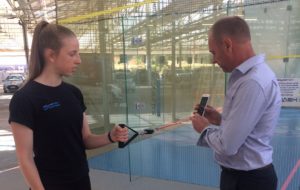
The device is one of the latest projects to receive support from the State Government’s Medical Technologies Program, delivered through Flinders University’s innovative Medical Device Partnering Program (MDPP).
Developed by Prohab CEO Lyndon Huf, the rehab device connects to resistance bands, widely used in physiotherapy, to precisely measure the force applied to the band. The data is then captured and sent to an app where it can be visualised instantaneously as well as tracked over time.
The device aims to motivate patients recovering from injury, or surgery, by keeping track of real time progress. In addition, the device will help medical professionals make better and more tailored treatment recommendations to patients.
With support from the program and biomedical engineers from the MDPP, Prohab now has a prototype for trial and manufacture. The company aims to make the device in South Australia and export it worldwide, strengthening the State’s economic future by driving economic growth and creating new jobs locally.
Prohab CEO, Lyndon Huf says the MDPP’s technical expertise was outstanding.
“The opportunity to bring research and technical expertise to bear on an early-stage commercial project is tremendous. The MDPP helps to take concepts into reality in a really innovative way,” Mr Huf says.
“The next step for us is refining the device and building the software to go with it. Then it’s about proving the device’s value to a selection of industry champions, and securing strategic investment so we can bring it to market as soon as possible.
Prohab is currently trialing the device with athletes from Squash SA and is in discussion with several national and international sporting organisations.
Health Industries Minister Martin Hamilton-Smith says this new device is a great example of a product that can be manufactured right here in South Australia and sold in markets worldwide – from physios, rehabilitation specialists, gyms and sports clubs.
MDPP Director Professor Karen Reynolds says “We know that arming patients with visual feedback in real time helps improve compliance with rehabilitation exercises, so this simple idea could have a big impact on the health and quality of life for many people following surgery or injury”.
“We’re delighted to have the opportunity to apply our engineering expertise and have high hopes that this device will create new, high-value, export-focused South Australian jobs,” Professor Reynolds says.
Other projects supported in the latest round of the Medical Technologies Program include:
Sigma Ergonomics Pty Ltd: to design and build a new digitally controlled exoskeletal arm for use by sonographers to ensure they are adequately supported when conducting ultrasounds on patients
Healthcare Innovations Australia Pty Ltd: to conduct a validation study of Exoflex’s functionality as a clinical assessment tool in hand therapy
Australian Orthopaedic Fixations Pty Ltd: to assist Austofix in the development and functioning prototype of a device to assist orthopaedic surgeons when fixing bone fractures. They will also receive assistance to design and build a wireless system and mobile application to enable pre-calibration of the device and control from a smart device.
The MDPP at Flinders University is funded by the State Government’s Medical Technologies Program.
It partners medical innovators with leading biomedical engineers, providing them with research and development assistance, as well as market intelligence to help turn bright ideas from the laboratory and into commercial reality, benefitting the wider community and creating new opportunities for local manufacturers.
Successful applicants can receive access to up to 250 hours of research and development assistance and a 30-hour commercial assessment.
To view the ABC Adelaide news coverage, click here.

